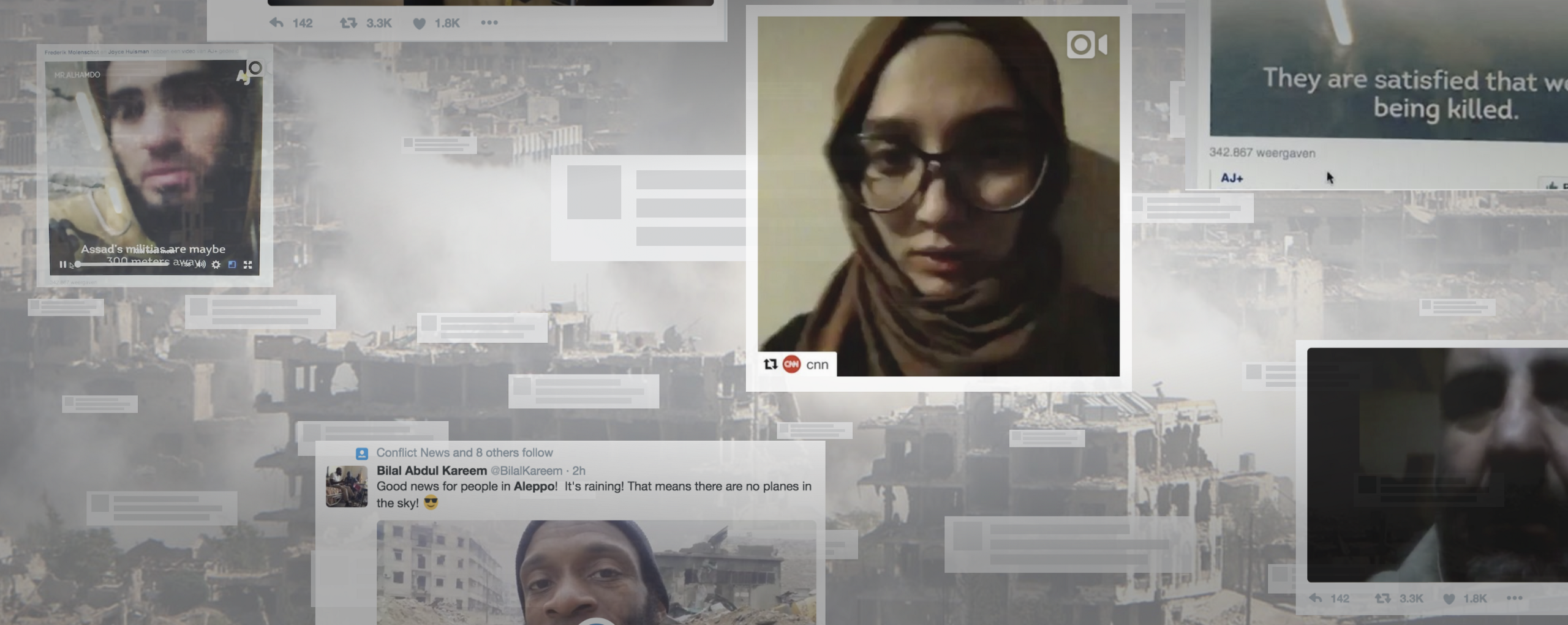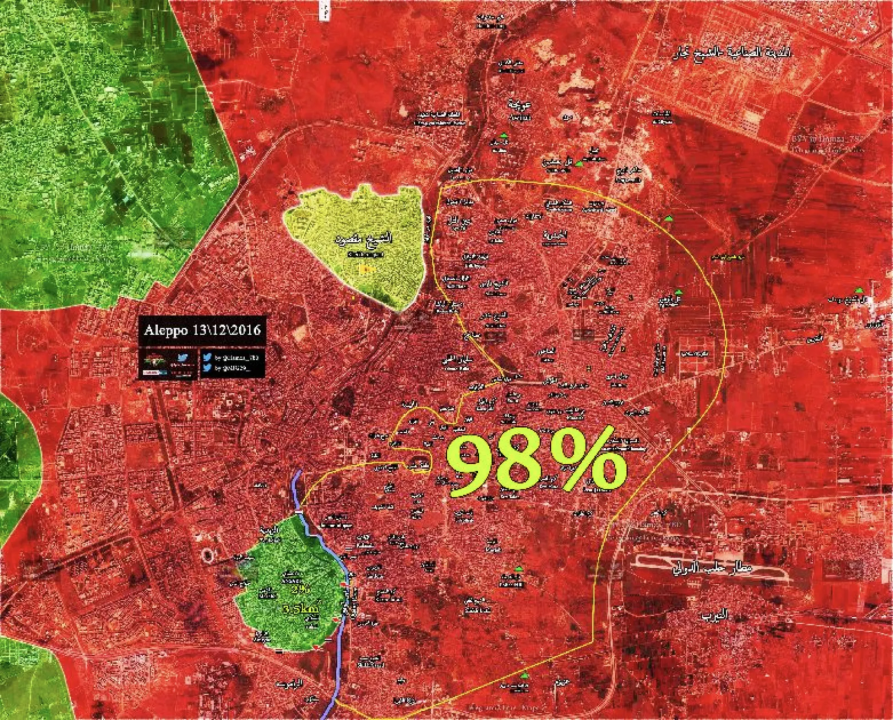Aleppo’s Final Goodbyes
Harrowing stories from the city’s last hours
Aleppo’s Final Goodbyes
Share this story

BANNER: People in Aleppo were sharing what might have been their final thoughts and last messages to the world as regime forces advanced upon Eastern Aleppo.
The last 24 hours have shown a grim picture of Aleppo.
Reporting from regime and opposition sources alike show government forces in control of all but a few of the city’s neighborhoods. The fall of Aleppo would be a massive turning point in the ongoing Syrian Civil War. As one of the last major Syrian cities not under government control, the loss would be a disastrous blow to rebel forces, throwing the future of the rebellion into doubt.
Those few areas in the east of Aleppo still held by rebel forces are reportedly filled with thousands of civilians fleeing the regime’s onslaught. Opposition officials estimate that more than 100,000 civilians remain in the besieged areas of the city, sheltering from the ongoing bombardment of regime airstrikes and missile attacks.
US and Russian negotiations over evacuation of civilians proved unfruitful, leaving thousands stranded, until a tentative ceasefire was agreed upon during late Tuesday evening. The effectiveness of the ceasefire is yet to be seen.
Meanwhile, numerous reports have described the execution of hundreds of civilians by Assad-allied militant groups. The UN reported that multiple sources detailed the extrajudicial killings of at least 82 civilians across recently captured neighborhoods, including 11 women and 13 children.

The UN’s human rights office described accounts of regime-allied forces entering homes in the remaining rebel holdouts and shooting civilians on-site. According to spokesperson Rupert Colville, the UN received many reports of “people being shot in the street trying to flee and shot in their homes.” He warned that there could be many more such incidents.
While the UN and other sources have cited these reports as reliable, many people online have been quick to share images reportedly depicting the atrocities which are not in fact verifiable. A viral image purportedly showing regime forces executing rebels in eastern Aleppo was quickly debunked using a reverse google image search. It was in fact an image depicting an ISIS execution from 2014.

Another picture claiming to show a girl running in Aleppo after her family was killed turned out to be a still from a 2014 music video.
Spokespeople from both the Syrian and Russian governments have routinely denied allegations of their forces’ involvement with extrajudicial civilian killings, claiming that the reports were either false or that “terrorist” groups were responsible for such atrocities. Similarly, Russian foreign minister, Sergei Lavrov, pushed back against calls for a truce. “We are tired of hearing this whining from our American colleagues in the current administration,” he told journalists from Belgrade, adding that the US and its allies did not adequately confront the seriousness of the terrorist threat in Aleppo.
If you see a picture claiming to be from Aleppo, then quickly do the following before sharing it. #BreakingAleppo #fakenews pic.twitter.com/aL6UE94uUB
— Eliot Higgins (@EliotHiggins) December 13, 2016
But how do you spot fake photos and videos in Aleppo?
Make sure you cross-check online posts before spreading them. Our colleagues at First Draft and Bellingcat have set up some how to guides with the help of Google News Lab.
(Watch the post from our Senior Fellow Eliot Higgins on the left)
Tens of thousands have reportedly fled the city, but many report that the conditions and heavy shelling in recent days have made such an option impossible. Recent reports claim that continual bombing has prevented even basic humanitarian work from being completed on the ground.
In an interview with the BBC, English teacher Abdul Kafi Alhamado described the scene in apocalyptic terms: “Bombs are everywhere. People are running, they don’t know where, just running. People are injured in the streets. No-one can go to help them. Some people are under the rubble, no-one can help them. They just leave them under the rubble until they die — these houses as their graves.”
In another account, the UN’s children agency said that according to a doctor in the city, over 100 unaccompanied children had been trapped in a building that was under siege in the East of the city. The UN spokesperson detailed a ‘complete meltdown of humanity’.
Many in the bombarded enclave are taking to social media to issue desperate cries for help, document the harrowing final hours of the city, and share their last goodbyes with the world. Accounts of these final hours reveal horrific images of violence against civilians and hopeless situations for those remaining.
Activist Lima Shamy posted from the ground saying this could be her last video while warning of the dangers those sheltered with her faced, including field executions and continued bombings.
In a periscope video, another activist, Mr. Alhamdo, said his last goodbye, lamenting that he could no longer believe in the United Nations or the International Community as they failed to save the citizens of Aleppo and provide them the freedom they sought after all these years.
A recent statement from UN secretary general, Ban Ki-moon, expressed alarm over the reports of the atrocities taking place in Aleppo and urged the protection of civilians and international human rights. But at this late hour, despite the recently agreed ceasefire, there seems to be little hope on the ground that such calls will be answered.
Nicholas Yap is a program assistant at the Atlantic Council’s @DFRLab. Follow the events of the unfolding crisis in Aleppo via #BreakingAleppo and stay up to date with our latest stories on Twitter @DFRLab.
What comes after Aleppo? @AtlanticCouncil Senior Fellow Faysal Itani provides a forecast in the New York Times.
Make sure to also state up to date with the @AtlanticCouncil’s SyriaSource for regular in-depth analysis from Syria.












